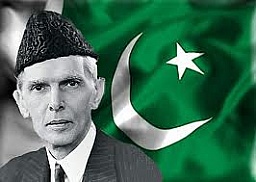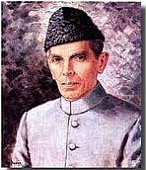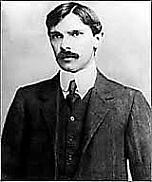
Founder of Pakistan, Muhammad Ali Jinnah
Jinnah moved to London in 1930 for political dialogue with the British government and work for the representation of Indian Muslims in Britain. During this period, he participated in the 1930 Round Table Conference. Due to his firm position regarding the rights of minorities in British India, Congress leaders was not happy with him. As a result, due to the British-Congress companionship, he was not invited for the next two conferences. Jinnah decided to stay in Britain so that he could convince British politicians about the state of affairs in India. He worked in the Privy Council Bar during this period. Muslims of Bombay elected him in his absence as their representative for the Central Legislative Assembly in October 1934. In 1934, Jinnah returned India and began to reorganize the party, being closely assisted by Liaquat Ali Khan, who visited Jinnah in London in 1933 and would act as his right-hand man.
Jinnah offered an alliance with the Congress"”both bodies would face the British together, but the Congress had to share power, accept separate electorates and the League as the representative of India's Muslims. The latter two terms were unacceptable to the Congress, which had its own national Muslim leaders and membership and adhered to secularism. Even as Jinnah held talks with Congress president Rajendra Prasad, Congress leaders suspected that Jinnah would use his position as a lever for exaggerated demands and obstruct government, and demanded that the League merge with the Congress. The talks failed, and while Jinnah declared the resignation of all Congressmen from provincial and central offices in 1939 as a "Day of Deliverance" from Hindu domination, some historians assert that he remained hopeful about an agreement.
In 1941, Muhammad Ali Jinnah founded Dawn, a major newspaper that helped him propagate the League's point of views. During the mission of British minister Stafford Cripps, Jinnah demanded parity between the number of Congress and League ministers, the League's exclusive right to appoint Muslims and a right for Muslim-majority provinces to secede, leading to the breakdown of talks. Jinnah supported the British effort in World War II, and opposed the Quit India movement. During this period, the League formed provincial governments and entered the central government. The League's influence increased in the Punjab after the death of Unionist leader Sikander Hyat Khan in 1942. Gandhi held talks 14 times with Jinnah in Bombay in 1944, about a united front"”while talks failed, Gandhi's overtures to Jinnah increased the latter's standing with Muslims.
Jinnah issued a call for all Muslims to launch "Direct Action" on 16 August to "achieve Pakistan". Strikes and protests were planned, but violence broke out all over India, especially in Calcutta and the district of Noakhali in Bengal, and more than 7,000 people were killed in Bihar. Although viceroy Lord Wavell asserted that there was "no satisfactory evidence to that effect", League politicians were blamed by the Congress and the media for orchestrating the violence. Interim Government portfolios were announced on 25 October 1946. Muslim Leaguers were sworn in on 26 October 1946. The League entered the interim government, but Jinnah refrained from accepting office for himself. This was credited as a major victory for Jinnah, as the League entered government having rejected both plans, and was allowed to appoint an equal number of ministers despite being the minority party. The coalition was unable to work, resulting in a rising feeling within the Congress that independence of Pakistan was the only way of avoiding political chaos and possible civil war. The Congress agreed to the division of Punjab and Bengal along religious lines in late 1946. The new viceroy Lord Mountbatten of Burma and Indian civil servant V. P. Menon proposed a plan that would create a Muslim dominion in West Punjab, East Bengal, Baluchistan and Sindh. After heated and emotional debate, the Congress approved the plan. The North-West Frontier Province voted to join Pakistan in a referendum in July 1947. Jinnah asserted in a speech in Lahore on 30 October 1947 that the League had accepted independence of Pakistan because "the consequences of any other alternative would have been too disastrous to imagine."
The independent state of Pakistan, created on 14 August 1947, represented the outcome of a campaign on the part of the Indian Muslim community for a Muslim homeland which had been triggered by the British decision to consider transferring power to the people of India.



